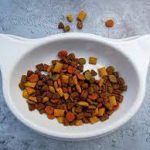
Guinea pigs are extremely hungry creatures, so any loss of appetite should be addressed immediately by visiting a qualified exotics vet and possibly offering syringe feeding as soon as possible.
As prey animals often hide signs of illness to avoid predators discovering their weakness, it may be difficult to tell whether an animal is experiencing pain; however, certain warning signs should be noticeable.
Contents
1. They’re not hungry
As herbivores, guinea pigs require constant movement of their gut to properly digest food and absorb essential nutrients. If they stop eating altogether or eat too little, this could lead to gut stasis that leads to death for these little guys.
If your guinea pig has started losing weight, has an reduced appetite or stopped poopsing, take them immediately to see your vet as this could be a telltale sign of disease or infection including GI Stasis, Cancer, Dental disease Liver disease and Kidney disease.
As another telltale sign that your guinea pig is in distress, they may lie on their side a lot. This could be a telltale sign of stress and could also indicate bladder or kidney stones that cause pain; to get to the bottom of this quickly it is essential that they get checked by an experienced veterinarian in the care of cavies so they can get diagnosed and treated swiftly.
2. They’re not interested
Guinea pigs should be active grazers throughout their day, eating throughout. This keeps their digestive systems working at peak performance. If their appetite seems to have reduced significantly, this could be an indicator that there may be an underlying issue to address.
Dental issues (which can lead to pain and discomfort), illness, or just general stress could all play a factor. Emergency food sources like pellets and low sugar fruits/veggies may help provide your pet with essential nutrition if they become disinterested in eating their usual hay.
At all times, ensure there is enough hay in their cage as this helps wear down their continuously expanding teeth and keep them feeling contented. Without enough hay available they could develop something called GI stasis where their digestive tract stops moving properly and this could pose serious health issues for your pet.
3. They’re not pooping
Your most frightening experience as an owner should come when your piggie stops eating regularly – especially since pigs tend to be so hungry! Additionally, dry poop could indicate a lack of food or serious illness such as cystitis (bladder or kidney stones). Emergency feed should always be on hand should they refuse their pellets.
Guinea pigs are typically self-feeders and their faeces contain essential nutrients. When they become impacted, however, this condition known as gastrointestinal stasis can become life threatening in as little as 24 hours and be caused by anything from large pieces of plastic to old food that was indigestible or internal tumors. If your guinea pig straining or acting like they’re going to poop but nothing comes out, that is a sure sign they have this issue; calling the vet immediately is crucial.
4. They’re not moving
Wenn guinea pigs stop eating it’s typically a telltale sign they need veterinary help – whether that be something as minor as changing their diet, or as serious as Hepatic Lipidosis which can prove fatal for these little furries.
When your guinea pig stops moving it may indicate exhaustion or shock – in either case they should see a vet immediately!
Guinea pigs tend to be very hungry creatures, so any decrease in appetite should be cause for alarm. By regularly inspecting and weighing your furry friend you can spot issues before they get worse. In order to help your guinea pig stay happy and healthy you could also use ceramic food bowls rather than plastic ones; ceramic ones are generally more secure, helping prevent injury to your furry pal.


